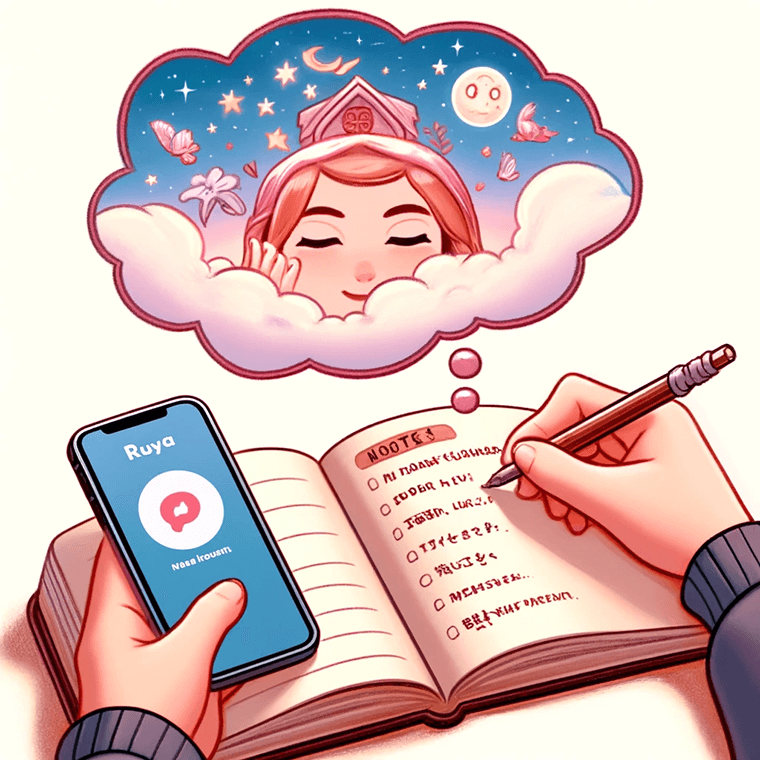
5 Practical Steps to Remember Your Dreams
Have you ever woken up trying to grasp the remnants of a vivid dream? Understanding how to remember dreams is a skill that offers profound insights into our emotions and the subconscious mind. In this guide, we'll cover five practical strategies that enhance your dream recall effectively. Whether you're an occasional dreamer or a sleep enthusiast, these techniques, alongside the innovative features of the Ruya app, will transform your ability to recall and interpret your dreams. Explore these methods and ensure your nighttime visions stay with you long after dawn.
1. Remember Straight Away Upon Waking
Wake Up and Remember: The First Moments Are Crucial
As soon as you open your eyes, focus on recalling any fragments of dreams before you move or get distracted. The state you wake up in is the most fertile for dream recall. Try to replay any dream snippets in your mind as if rewinding a video, moving from the moment of waking backwards to piece together the storyline. Keep a pen and paper beside your bed to jot down details as they come to you—this could be anything from a face or a feeling to a full scene. The act of writing down your dreams not only preserves them but also trains your mind to remember more over time.

2. Keep a Dream Journal Handy
Having a dream journal by your bedside isn't just a quaint idea; it's a powerful tool for self-discovery and personal growth. In the wee hours of the morning, when dreams are freshest in your mind, jotting down the details can provide invaluable insights into your subconscious mind. This practice, endorsed by psychologists and dream researchers alike, allows you to trace patterns, themes, and recurring symbols in your dreams. Over time, you might even start to decipher the unique language of your subconscious, unlocking deeper understandings of your inner self and emotional wellbeing.
Moreover, keeping a dream journal encourages a stronger connection between your waking and dreaming states, making it easier to recall dreams and recognize the links between your dream world and reality. Whether you're using a traditional notebook or a digital app like Ruya, the act of recording your dreams can significantly enhance your introspective journey. So, why not start tonight? You might be surprised at what you discover about yourself.
Log Your Dreams: Every Detail Counts.
Get into the routine of writing down every detail you remember about your dreams, no matter how minor or brief. This should include not only the events or imagery but also how these dreams made you feel. For example, if you dreamt about a beach, note whether it evoked feelings of peace, happiness, or perhaps there was something quite unsettling about it. By documenting both the content and emotional backdrop of your dreams, you're not only preserving the vividness of your dream experiences but also potentially improving your ability to remember them. Having a physical dream diary or a digital note-taking app on your phone right by your bed makes it easy to jot these details down the moment you wake up.

3. Prepare the Way for Recalling Dreams
Prepare Your Sleep Environment: Optimize Your Bedroom for Dreaming
Creating a conducive sleep environment is crucial for vivid dreams and effective recall. Ensure your bedroom is a sanctuary for sleep: keep it quiet, dark, and cool. Consider using blackout curtains to minimize light, and perhaps add white noise or a fan to drown out disruptive sounds. A comfortable mattress and pillows tailored to your sleeping style can also enhance the quality of your dreams by promoting deeper sleep. By fostering these conditions, you set the stage not only for restful sleep but also for dreams that are easier to remember upon waking.

4. Wake Up with a Plan
Master the Art of Timing: Use Natural Wake-Up Cues
Plan your sleep schedule so that you wake up naturally at the end of an REM sleep cycle when dreams are most vivid. This typically occurs after a full cycle of sleep, about every 90 to 110 minutes. To align with these cycles, try going to bed at a time that allows you to wake up naturally after multiple full cycles—such as 7.5 or 9 hours of sleep. Alternatively, if you must use an alarm, opt for one that wakes you with gentle sounds or gradually increasing light, mimicking a natural sunrise. These methods can help minimize the abruptness of waking, which often scatters the fragile threads of dream memories.

5. Reflect and Connect
Engage With Your Dreams: Reflect to Understand
Spend some time each morning reflecting on your dreams and their possible meanings. With Ruya, you can delve deeper into your dream analysis by choosing your favorite scientific perspective for interpretation, allowing you to see your dreams through different analytical lenses. Whether you prefer a psychological, neurological, or even a cultural viewpoint, Ruya’s AI-driven tools offer tailored insights that might not be immediately obvious. Additionally, Ruya provides statistics about your sleep patterns, enabling you to track trends and correlations between your sleep quality and dream content. This comprehensive approach helps you connect with your dreams on a more profound level, enhancing both your understanding and your recall over time.

Conclusion:
Remembering your dreams isn't just a nifty trick—it's a gateway to deeper self-understanding and emotional clarity. By adopting the practical steps laid out in this guide, you can significantly enhance your ability to remember and interpret your dreams. The Ruya app aids this process with its unique offerings, including an easy-to-use bedside dream journal and advanced AI-driven interpretations. Embark on this transformative journey tonight, and wake up tomorrow ready to delve into the vast universe of your dreams. Dive into the hidden messages of your subconscious and set off on a journey of self-discovery. Give Ruya a go today and view your dreams through a whole new lens.





